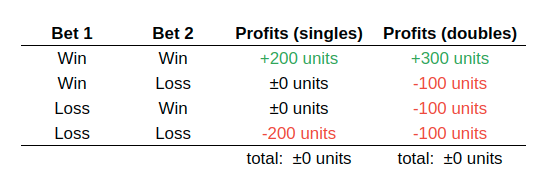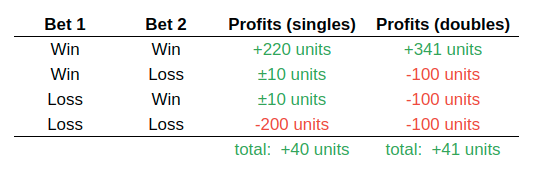
What's best - singles or doubles?
Let's have a look at singles, doubles, and so on. A lot of people in the business will claim that always playing singles is in your best interest - while bookies advertise their odds on accas and parlays. But what is actually true?
There are two relevant factors in play: odds and probability. That is, simply put, all there is to it - the bookie estimates the chances of something happening and sets the odds accordingly, at slightly lower value. Then you do the same, and if your estimate says that the odds are good enough, you place the bet.
If odds and probability equal each other, neither the player nor the bookmaker has any advantage. That bet will, if placed enough times, average out to zero. This is shown easily by pretending to place two bets at 2.00 for 100 units each, where the probability of the bet going your way is 50 % for each bet. Four things can happen:
- You win both bets
- You win the first bet, but lose the second
- You lose the first bet, but win the second
- You lose both bets
Let's try placing those bets twice: both as singles and in the form of doubles. That gives us this pretty little table:

Not very exciting, is it? Now let's instead see what happens if we use the same bet size and probability, but raise the odds to 2.10 instead.

Oh, this is interesting. What just happened? We suddenly make more money by playing the parlay!
When you combine two bets into a double, the potential winnings are larger because you multiply the winnings instead of just adding them together. And the same is true for your advantage over the bookie! So by playing a parlay, you multiple your advantage as well. Hence, your advantage over the bookmaker is larger if you play parlays over just single bets.
But, of course - this also holds true going the other way. If you play a parlay where you've misestimated the odds, you're now multiplying the bookmaker's advantage over you, and you'll lose money faster in the long run.
So why even play singles?
This raises a glaring question: why not just play parlays all of the time, if that yields larger profits?
The largest reason is called variance. Your goal in betting should always be stability. Playing parlays increases the variance over playing single bets, and the larger the parlay, the more the variance increases. In practice, you need to be very aware of the risk your bankroll is succumbed to when you place a parlay.
The reason for this is fairly simple. Have a look at the first table again. Even though the results are the same whether you play singles or doubles, the singles don't vary as much - you make a small profit, you make a small loss, etc. When playing doubles, the chances of the bet actually winning is much lower, which means you'll encounter larger swings.
(Of course, keeping your bankroll in check is an entire field of study on its own - and reading up on things like the Kelly criterion is well worth your time.)
In conclusion
The logical conclusion is that playing parlays is a good thing unless your variance increases too much. For instance, if you place one bet at the odds of 1.42 and another at 1.49, they'll be great in a double, since they'll end up with the combined odds of 2.1158, which does well in this regards. Exactly what odds to aim for is up to you. Around 2.00, double your money, is common and reasonable.
Finally: all of the above is true only given the assumption that your bets are profitable. And we do hope they are!
Terminology
Single: A single bet that is not part of a parlay.
Double: A parlay consisting of two bets. Their odds are multipled to get the odds of the parlay.
Triple: The same as for a double, but for three bets.
Parlay: Having more then one bet on the same coupon.
Bankroll: Your available betting funds.
Variance: A measure of how much you can be expected, mathematically speaking, to have good or bad luck with your bets over time.
ThePlayer.com recommends
Terms and conditions apply
-
Offer for new players only. This offer cannot be combined with any other offer. Terms & Conditions apply.
Top bookmakers
Terms and conditions apply
-
Offer for new players only. This offer cannot be combined with any other offer. Terms & Conditions apply.
-
Offer for new players only. This offer cannot be combined with any other offer. Terms & Conditions apply.
-
Offer for new players only. This offer cannot be combined with any other offer. Terms & Conditions apply.





